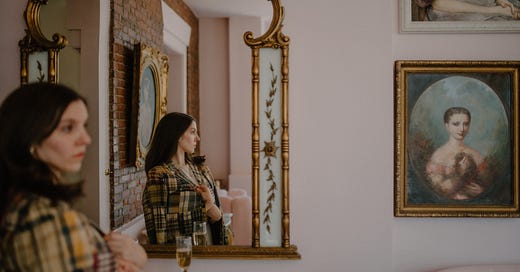Coming Out of the 'Broom Closet'
The Official ZGB Origin Story, Being the Genesis of The Preppy Witch Primer
broom closet: (n., colloq.) a term used by the pagan community for those who haven't yet revealed their religion to others, also applies to those who consider themselves witches… Comparable to a non-straight person still in the closet. By telling others, you can come out of the broom closet.
I'm seriously looking at Wicca, but to my parents I'm still in the broom closet.
– submitted by rhynne to the Urban Dictionary, 2007
…
Being a weird kid is never easy. Without going on about it, I passed through a series of schools from public to private, alternative to religious, and confounded each of them. This isn’t stated with pride but with a wince, and only relevant for the context of my upbringing in what now seems like a series of liminal states. Much as I tried to adapt to these diverse educational environments, it never took long to deviate from whatever their norm was, especially when I started talking back and seeking out the ghosts.
The paranormal has always fascinated me, and I almost always asked any indulgent adult, “Do you have any ghost stories?” Their answers often kept me up at night, but my interest was borne of already being awake due to hearing voices, floors creaking, and shadows transversing the hallway. I still can’t sleep properly with an open door. These entities in and around my parents’ house continue to make themselves known today, despite their initial placations.
Despite my aversion to school, our town’s library was always a refuge. After exhausting Scary Stories to Tell in the Dark, Witches & Magic-Makers from Eyewitness Books, and beginner-level “real haunting” books in the subterranean children’s section, I graduated to the adults’ library upstairs. For those who never learned the Dewey Decimal system, the 130 classification is where the “New Age” books are kept, including the supernatural, dreams, astrology, and witchcraft.
The selection was small but comprehensive, and the books my mother would not let me check out were exactly those which I wanted to read. Yet by the age of 13, the allure of Silver Ravenwolf’s Teen Witch had temporarily lost its luster. Around this time, a decrepit copy of The Official Preppy Handbook (OPH), edited by Lisa Birnbach, appeared on the library’s “used books” shelf for $1. Without these two fundamental tomes, I would not be writing what you are reading.
Like many books aimed at teens in the 1990s, Ravenwolf’s approach was very much “how do you do, fellow youths?” Birnbach’s compendium was something different; its contents were only slightly dated, with the long-form satire still as hilarious as it was when the book was published. Constantly in trouble for making snarky, or “inappropriate,” remarks, I learned from OPH that this criticism could be carefully crafted through writing, instead.
As the years progressed and peer pressure set in, I tried to suppress the strangeness that was seeping from my pores along with unrelenting hormonal sebum. No matter my popped collar or my pearls, I still felt at odds with myself and this conflict followed me into adulthood. While trying to build a career and still covertly practicing witchcraft, it wasn’t until my twenties that my esoteric interests brought me to a community of like-minded weirdos.

The idea for The Preppy Witch Handbook (PWP) came from Tim Marvin, founder of the GLOR clothing line. While discussing traditional American menswear, Tim jokingly suggested that I should design an L.L. Bean-themed Tarot deck. Two years later I released the first Preppy Witch Tarot card, The Empress, and by then I’d built up enough confidence to come out of the “broom closet” to my family and friends. Mumsey still doesn’t love that I call myself a witch, but Dad’s on board as long as I don’t make a spectacle of myself.
New England is a strange and haunted place, full of tradition and history that’s almost mythical. Through the staunch conformity that was actual law during the development of the United States, we lost much of the will to explore life’s mysteries. Both the culture and the counterculture that emerged from this society endure here to this day. With PWP, my sincere hope is that all readers can embrace their own weirdness and discover something new within themselves.








